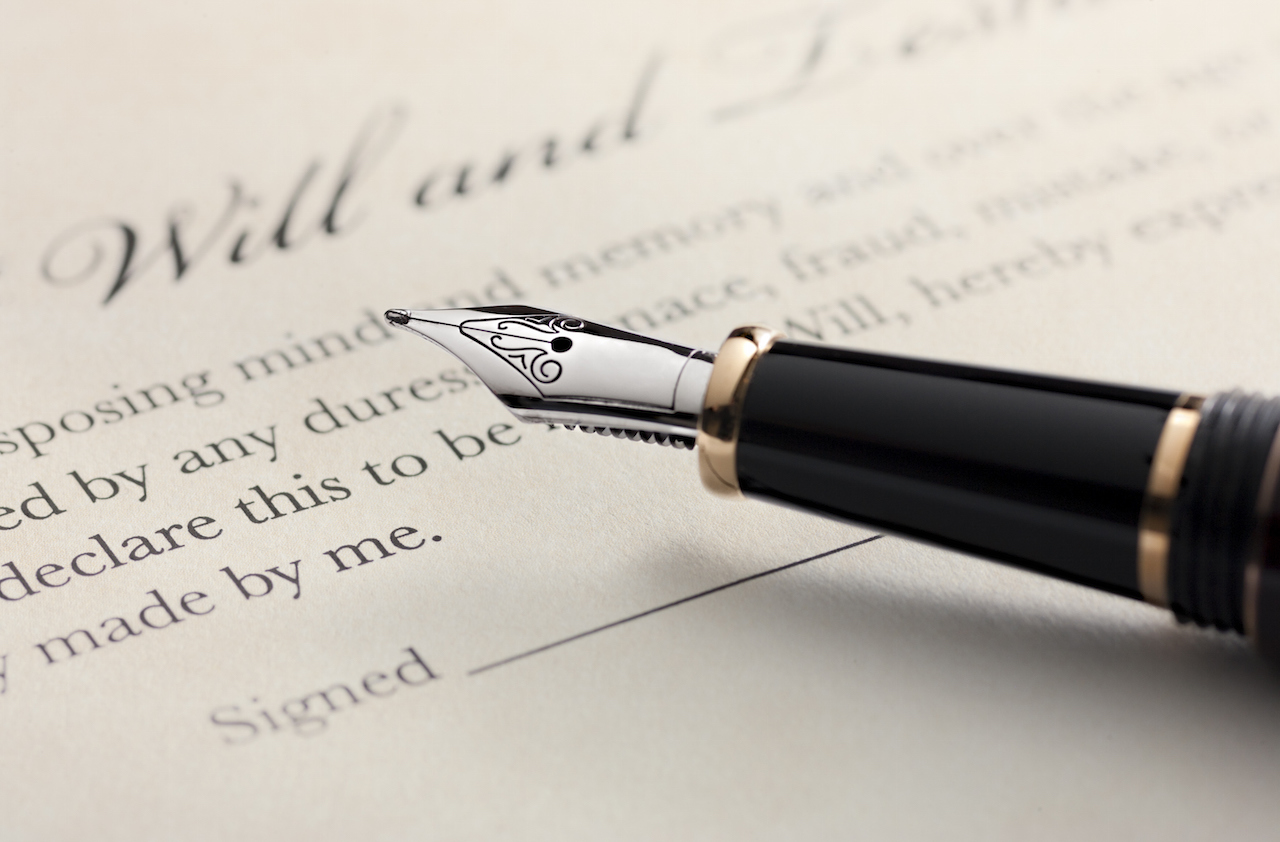6 Steps to a Good Will
This is no time for shortcuts. Learn what you should do to make sure your final wishes are carried out.

Profit and prosper with the best of Kiplinger's advice on investing, taxes, retirement, personal finance and much more. Delivered daily. Enter your email in the box and click Sign Me Up.
You are now subscribed
Your newsletter sign-up was successful
Want to add more newsletters?

Delivered daily
Kiplinger Today
Profit and prosper with the best of Kiplinger's advice on investing, taxes, retirement, personal finance and much more delivered daily. Smart money moves start here.

Sent five days a week
Kiplinger A Step Ahead
Get practical help to make better financial decisions in your everyday life, from spending to savings on top deals.

Delivered daily
Kiplinger Closing Bell
Get today's biggest financial and investing headlines delivered to your inbox every day the U.S. stock market is open.

Sent twice a week
Kiplinger Adviser Intel
Financial pros across the country share best practices and fresh tactics to preserve and grow your wealth.

Delivered weekly
Kiplinger Tax Tips
Trim your federal and state tax bills with practical tax-planning and tax-cutting strategies.

Sent twice a week
Kiplinger Retirement Tips
Your twice-a-week guide to planning and enjoying a financially secure and richly rewarding retirement

Sent bimonthly.
Kiplinger Adviser Angle
Insights for advisers, wealth managers and other financial professionals.

Sent twice a week
Kiplinger Investing Weekly
Your twice-a-week roundup of promising stocks, funds, companies and industries you should consider, ones you should avoid, and why.

Sent weekly for six weeks
Kiplinger Invest for Retirement
Your step-by-step six-part series on how to invest for retirement, from devising a successful strategy to exactly which investments to choose.
Writing a will is a sobering act that's easy to put off, which is probably why so many of us never get around to it. But consider for a moment what might happen if you don't leave clear instructions for the distribution of your property after you're gone.
If you die without a valid will, your state will supply a ready-made one that has been devised by its legislature. Like a ready-made suit, it may fit -- and it may not. The possibilities for trouble when you leave no will are nearly endless. A hostile relative might be able to acquire a share of your estate, for example, or a relative who is already well fixed might take legal precedence over needier kin.
So you should have a carefully written will. This is not a time to take shortcuts in the hope of saving a few bucks. It makes sense to pay a competent lawyer a reasonable fee to write a document that will lay out your wishes and stand up later to scrutiny by the probate court, your beneficiaries and anyone you choose not to make a beneficiary. Getting a good will also takes some thinking on your part. Will-writing kits, on paper or computers, can help you focus your thinking and get ready to meet with the lawyer.
From just $107.88 $24.99 for Kiplinger Personal Finance
Become a smarter, better informed investor. Subscribe from just $107.88 $24.99, plus get up to 4 Special Issues

Sign up for Kiplinger’s Free Newsletters
Profit and prosper with the best of expert advice on investing, taxes, retirement, personal finance and more - straight to your e-mail.
Profit and prosper with the best of expert advice - straight to your e-mail.
Here are six steps to take when crafting your will:
1. Size up your estate. Start by drawing up a list of your assets -- real estate, bank accounts, stocks, bonds, cars, boats, life insurance, profit-sharing and pension funds, business holdings, money owed to you, and the like. See How Large is Your Estate for more info.
2. Protect the children. If you have minor children, you'll have to decide who you want to take care of them if you and your spouse both die. This involves setting up a guardianship, a task that has two principal functions. The first is to provide for the proper care of the children until they reach the age of majority. The second is to manage the money and property you leave to the children and distribute it to them as you would wish.
The same person could fill both roles, but the "guardian of the person" can be different from the "guardian of the property." Choose the former for his or her nurturing abilities and the latter for financial knowledge and money-management skills. If you're divorced, you might be inclined to choose a separate property guardian because the surviving parent typically would get custody of your children. Name backup guardians in case your first choice dies, is incapacitated, or perhaps wants to relinquish the job after a few years.
In addition to your will, it helps to leave detailed instructions on how you want your children raised. In a letter, or even on videotape, you can spell out anything from your views on cars and part-time jobs for teenagers to your priorities on education and religion. These instructions can provide important guidance, but they aren't binding.
3. Distribute your property. Next you'll have to decide how you want your estate distributed. This is obvious and straightforward in many instances, such as leaving everything to your spouse, or to your children if both of you die. You needn't account for every piece of jewelry or every stick of furniture (but do account for pets). Making specific bequests of long lists of items like that in a will can needlessly complicate matters and lead to extra costs and delays. Write these up separately and let your executor carry out your instructions.
4. Choose an executor. Be prepared to name an executor (sometimes called an administrator), whose job it will be to see to the distribution of your estate and make sure any taxes, debts, and other obligations are paid.
Choose your executor carefully. Naturally, he or she should be someone you trust -- a relative, a friend, your lawyer, or anyone you feel is able to take on the responsible task of disposing of your estate. The person should be willing to do the job, so check before you name someone who might later refuse, thus forcing the court to appoint someone you might not have chosen.
A husband and wife can name each other or a mutually agreed-on person as executor for their wills. You'll also have to choose someone who will step in as executor if for some reason your first choice can't do it.
5. See the lawyer. For simple wills a generalist should be able to do the job at a reasonable price. If your estate is substantial, consult a lawyer who specializes in estate planning. Don't conclude hastily that your estate is too small for you to worry about taxes. Insurance policies, company benefits, investments, and home equity could make your estate larger than you think it is.
Depending on where you live, the complexities of the document you need, and the time you've spent sorting things out already, the lawyer's fee can range from as little as $300 or so for a simple will to $200 an hour for the time involved in planning a complex estate. There is no such thing as an average price.
6. Change it if you want. If your situation changes in the future, you can always amend the will. But don't do it yourself. You could invalidate the entire document in the eyes of the court, thus undoing the good you've done so far. Go to the expense of having the lawyer make the changes.
Once your will is written, don't just stuff it in a safe-deposit box. The box may be sealed after your death, making the document unavailable for a time. Perhaps you can keep it in the lawyer's vault or safe at home with your other important papers. You may also want to give a copy to the executor or the principal beneficiary. Subject to your lawyer's advice, consider including a letter of last instructions that will help your executor gather your affairs together and carry out your wishes.
Profit and prosper with the best of Kiplinger's advice on investing, taxes, retirement, personal finance and much more. Delivered daily. Enter your email in the box and click Sign Me Up.
-
 Here’s How to Stream the Super Bowl for Less
Here’s How to Stream the Super Bowl for LessWe'll show you the least expensive ways to stream football's biggest event.
-
 The Cost of Leaving Your Money in a Low-Rate Account
The Cost of Leaving Your Money in a Low-Rate AccountWhy parking your cash in low-yield accounts could be costing you, and smarter alternatives that preserve liquidity while boosting returns.
-
 I want to sell our beach house to retire now, but my wife wants to keep it.
I want to sell our beach house to retire now, but my wife wants to keep it.I want to sell the $610K vacation home and retire now, but my wife envisions a beach retirement in 8 years. We asked financial advisers to weigh in.
-
 What DOGE is Doing Now
What DOGE is Doing NowThe Kiplinger Letter As Musk's DOGE pursues its ambitious agenda, uncertainty and legal challenges are mounting — causing frustration for Trump.
-
 COVID Hospitalization Rates See an Uptick As Winter Looms — The Kiplinger Letter
COVID Hospitalization Rates See an Uptick As Winter Looms — The Kiplinger LetterThe Kiplinger Letter A new Omicron booster is available, but the elderly are still at risk and winter is right around the corner.
-
 Will Weight-Loss Drugs Spike Medicare Costs?: The Kiplinger Letter
Will Weight-Loss Drugs Spike Medicare Costs?: The Kiplinger LetterEconomic Forecasts Lawmakers are trying to get weight-loss drugs like Wegovy covered by Medicare. Long-term savings are possible, but it could cost the program $27 billion.
-
 Greenland, U.S. Plans to Boost Tourist Economy: Kiplinger Economic Forecasts
Greenland, U.S. Plans to Boost Tourist Economy: Kiplinger Economic ForecastsEconomic Forecasts A U.S. congressional effort could see some Canadian visitors get longer stays, meanwhile, Greenland bids to be the next vacation hotspot.
-
 Medicare Drug Price Negotiations Latest: Kiplinger Economic Forecasts
Medicare Drug Price Negotiations Latest: Kiplinger Economic ForecastsEconomic Forecasts Medicare drug price negotiations: Early signs have emerged of how these key talks will be handled.
-
 Forces That Affect Your Estate Plan
Forces That Affect Your Estate Planretirement From probate and ownership division to the taxing arm of Uncle Sam, here are four things that can influence what happens to your belongings.
-
 Make a Plan for Your Retirement Savings
Make a Plan for Your Retirement Savingsretirement The first step to effectively using your 401(k) is to assess your retirement needs.
-
 Tapping Your IRA in Retirement
Tapping Your IRA in Retirementretirement You can cash in your IRA all at once, but doing so could subject you to an enormous tax bill. You'll probably do better tax-wise by taking out as little as necessary each year.